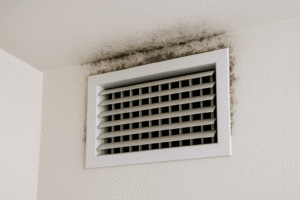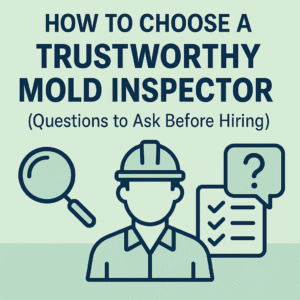Mold is a problem no homeowner wants to face. It can cause property damage, affect indoor air quality, and in some cases, create health concerns. If you suspect mold in your home, you might be tempted to grab an inexpensive “off-the-shelf” mold test kit from a hardware store or online marketplace.
At first glance, these Petri dish–style kits seem like a quick, easy, and affordable way to get answers. But here’s the problem: while they can grow something in a dish, they often fail to give you the accurate, actionable information you actually need.
Let’s break down the drawbacks and limitations of relying on these kits compared to hiring a licensed mold assessment consultant.
- No Professional Sampling Protocol
A mold test kit doesn’t come with an expert to identify where and how samples should be collected.
- Mold growth can be hidden inside walls, under flooring, or in HVAC systems – areas a simple kit won’t detect.
- A licensed consultant knows where to look, what areas to sample, and how to avoid sampling bias.
- Without proper site evaluation, you could get a false sense of security (missing a real problem) or a false alarm (reacting to normal, harmless spores).
- Misleading Results Are Almost Guaranteed
Every home has mold spores in the air as they are part of the normal fungal makeup both indoors and outdoors.
- A Petri dish test will almost always grow something, but this doesn’t automatically mean you have a problem.
- The results don’t tell you if the mold is from a normal background level or from active contamination.
- Licensed professionals follow the International Institute of Inspection, Cleaning and Restoration Certification (IICRC) S520 and industry-standard comparison methods to determine if levels are actually elevated compared to outdoor conditions.
- No Identification of the Source
The real value of mold testing isn’t just knowing mold is present, it’s knowing where it’s coming from and why.
- A DIY kit gives you no insight into whether the source is a roof leak, plumbing issue, humidity imbalance, or HVAC contamination.
- A licensed mold assessor will trace moisture sources, recommend corrective actions, and design a remediation plan.
- Without addressing the root cause, mold will return-no matter how much you clean.
- No Legally Defensible Documentation
If you ever need to prove mold conditions for insurance claims, landlord/tenant disputes, or real estate transactions, a Petri dish kit won’t hold up.
- Courts, insurers, and property managers require chain-of-custody lab results and professional interpretation.
- Licensed consultants provide certified reports that stand up to legal and regulatory scrutiny.
- No Interpretation or Health Context
Knowing a mold type (like Aspergillus, Penicillium, or Chaetomium) means very little without context.
- A DIY kit can’t tell you whether the concentration is high enough to pose a concern.
- Consultants are trained to interpret results in relation to industry thresholds, building conditions, and occupant health concerns.
- Potential for Costly Mistakes
By relying on incomplete or misleading information, homeowners may:
- Spend money cleaning areas that aren’t contaminated.
- Fail to remediate areas that are truly affected.
- Skip necessary moisture repairs, leading to recurring mold problems.
Why Hiring a Licensed Mold Assessment Consultant Makes Sense
A licensed mold assessor doesn’t just “test for mold.” They:
- Perform a full visual inspection and moisture mapping.
- Collect samples in a controlled, scientifically valid way.
- Compare indoor mold levels to outdoor baseline levels.
- Provide a written, certified report with clear recommendations.
- Help you avoid unnecessary remediation or make sure it’s done right.
While a Petri dish test might seem cheaper, it can actually cost you more in the long run through misdiagnosis, unnecessary work, or unresolved mold issues. Hiring a qualified, licensed professional ensures you get accurate answers, a real plan, and peace of mind.
Bottom line: If you suspect mold in your home, skip the DIY test kits. Call a licensed mold assessment consultant who can give you reliable, actionable information-and protect both your health and your investment.
Petri Dish Mold Test vs. Licensed Mold Assessment Consultant
Feature | Off-the-Shelf Petri Dish Test | Licensed Mold Assessment Consultant |
Sampling Protocol | No professional guidance; homeowner decides where/when to sample (often missing problem areas) | Follows industry protocols; strategic sampling for accurate, representative results |
Result Accuracy | Almost always grows mold, even in normal conditions; can cause false alarms | Determines if levels are elevated compared to outdoor baseline |
Source Identification | Cannot identify moisture source or location of contamination | Locates source, assesses moisture issues, and recommends fixes |
Result Interpretation | Basic mold type name, no health or severity context | Full interpretation with industry thresholds and context |
Documentation | No legal standing; not accepted for insurance or real estate disputes | Certified report with chain of custody; legally defensible |
Hidden Mold Detection | Cannot detect mold inside walls, floors, or HVAC | Uses inspection tools (moisture meters, thermal cameras) to locate hidden mold |
Long-Term Solution | No remediation guidance; risk of recurrence | Provides detailed remediation plan and prevention strategies |
Cost Over Time | Can lead to costly mistakes or missed problems | Saves money by targeting actual issues and avoiding unnecessary work |



